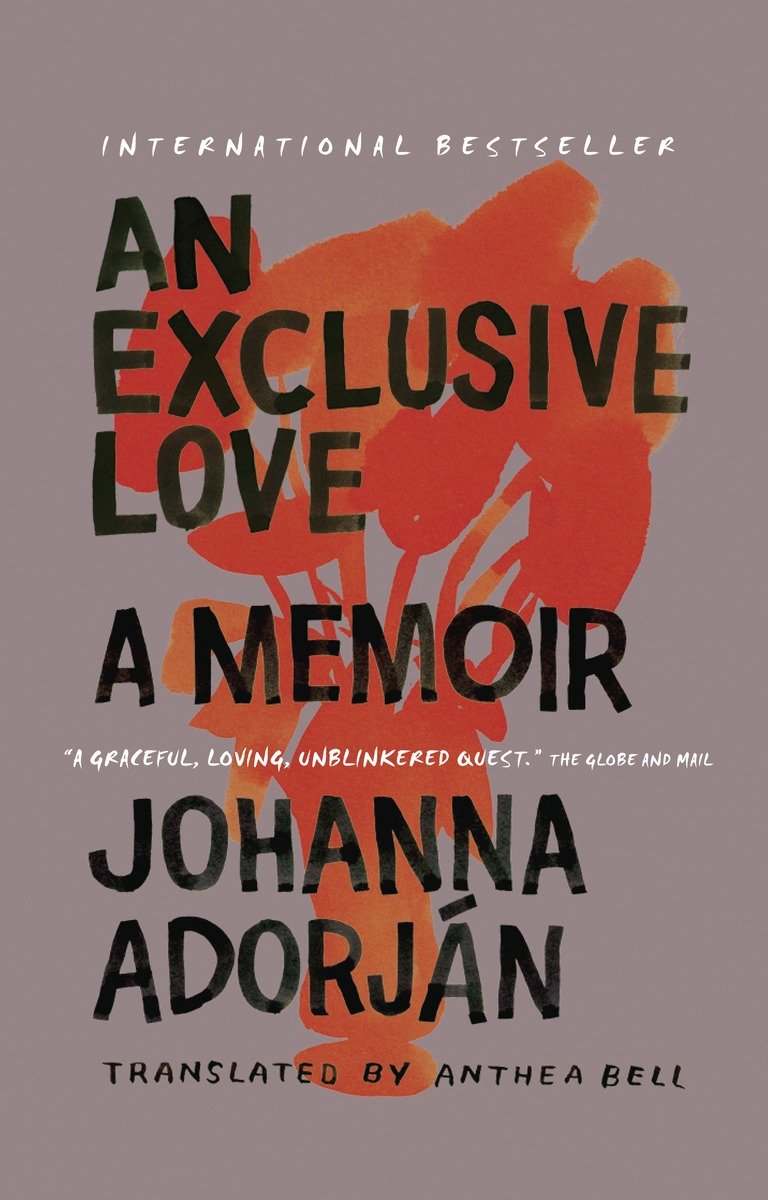An Exclusive Love
16.00 JOD
Please allow 2 – 5 weeks for delivery of this item
Description
Two people who have grown old together decide to take their own lives. He is terminally ill; she doesn’t want to be without him. One Sunday in autumn 1991, they carry out their plan. Vera and István go to their deaths holding hands. It is the logical end of a love that shut out the entire rest of the world, even their own children. They used the formal “Sie” form of address for each other throughout their whole lives together, chain-smoked and were incredibly good-looking. They also had a past they did not speak about — a past they did not want to remember. As Hungarian Jews, they had survived the Holocaust, had become Communists and during the uprising in Budapest in 1956 had fled the country. They started a new life in Denmark and — so it seemed — never looked back. Sixteen years after her grandparents’ deaths, Johanna Adorján ignored the family rule of “That’s something we don’t talk about.” She set out to look for the blind spots in the lives of her grandparents and in the process found out things that have more to do with herself than she had expected. Against the backdrop of the disasters of twentieth-century European history, she brings Vera and István back to life — a fascinating couple, unconventionally elegant, often going against the grain.
Additional information
| Weight | 0.25 kg |
|---|---|
| Dimensions | 1.61 × 14.03 × 22.1 cm |
| PubliCanadanadation City/Country | Canada |
| by | |
| Format | Paperback |
| Language | |
| Pages | 192 |
| Publisher | |
| Year Published | 2012-2-14 |
| Imprint | |
| ISBN 10 | 0307399540 |
| About The Author | JOHANNA ADORJÁN, born in 1971 in Stockholm, studied theatre and opera directing. She has worked as an editor and freelance author for various newspapers and magazines. Since 2001 she has been an editor of the culture section of the Frankfurter Allgemeine Sonntagszeitung in Berlin. She has written theatre pieces, as well as a screenplay that has been filmed by Ed Herzog. Johanna Adorján lives in Berlin. |
A Barnes & Noble Discover New Writers PickA New York Times Book Review Editor's ChoiceA Vogue Australia Required Reading Pick“A spare, beautiful exploration. . . . This fascinating couple . . . come slowly into focus for the author and the reader simultaneously, or so Adorján makes it seem. That’s what makes a good memoir—it’s not a regurgitation of ordinariness or ordeal, not a dart thrown desperately at a trendy topic, but a shared discovery.” — Neil Genzlinger, The New York Times Book Review “Elegant. Is this what makes their last day so fascinating? Elegance is magnetic, and so is lifelong love. The reader cannot take her eyes from them.” — Los Angeles Times"This is an intense, complex, uplifting, passionate, painful and often hilarious story of love. And a story of searching for love. And a story of searching for a history that is at once personal and universal. A past that is part of the present." — Lily Brett"The fact that the author does not tire in inquiring into this riddle, that she scrutinizes everything anew, courageously and with a biting wit, makes her book about a grim Sunday a sparkling work." — Frankfurter Allgemeine Zeitung"Despite its sadness, this book is very uplifting, and the author writes in a beautiful and very authentic voice." — German Book Office"A powerful, reflective and thought-provoking work, with echoes of similar recent treatments of the theme but distinct in its own right." — New Books in German“I was very much moved by An Exclusive Love—such clarity of thought and feeling. What I think of Anthea Bell as a translator is little short of reverence, after what she did for W. G. Sebald: one trusts her absolutely, so I know for sure that Johanna Adorján writes with beautiful precision and suppleness. It’s a truly memorable book.” — Diana Athill, author of Somewhere Towards the End “A wonderful, extraordinary book.” — Judith Kerr, author of When Hitler Stole Pink Rabbit “What we have here is a sophisticated intelligence, coupled with the sensibility of an artist, creating a narrator who tells a familiar tale, as though for the first time. This book is, indeed, the memoir as literature.” — Vivian Gornick, author of The Men in My Life |
|
| Excerpt From Book | On 13 October 1991 my grandparents killed themselves. It was a Sunday. Not really the ideal day of the week for suicide. On Sundays family members call each other, friends drop in to go walking their dogs with you. I’d have thought a Monday, for instance, much more suitable. But there we are, it was a Sunday, it was in October. I picture a clear autumn day, because it all happened in Denmark. My grandparents lived in Charlottenlund, a suburb of Copenhagen where all the houses have gardens and you call your neighbours by their first names. I imagine that my grandmother was the first to wake that morning; I imagine her waking up, and her first thought is that this is the last morning she will ever wake up. She will never wake up again, and she will only go to sleep once more. My grandmother sits up quickly, pushes back the covers and puts on the slippers that she leaves neatly beside the bed every evening. Then she gets to her feet, a slender woman of seventy-one, smooths out her nightdress, and quietly, so as not to wake my grandfather, she walks the few metres to the door.In the corridor she is welcomed by Mitzi the dog, wagging her tail. Mitzi is an Irish terrier bitch, a nice dog, phlegmatic, not particularly obedient. My grandmother gets on well with her. She speaks Hungarian to Mitzi. ‘Jó kis kutya,’ says my grandmother when she has quietly closed the bedroom door, good little dog. She has a low bass voice like a man’s, probably as a result of all those cigarettes, she’s a chain-smoker. In my imagined picture of that morning, I could go back again and place a lighted cigarette between her fingers directly after she wakes up, Prince Denmark brand, extra strong (advertising slogan: Prince Denmark for Real Men). Yes, she’ll have lit herself a cigarette once she had her slippers on, at the latest. So as she pats the dog’s head in the passage, quietly closing the bedroom door behind her, the air smells of fresh smoke.A little later the smell of coffee mingles with the cigarette smoke. A keen nose would also pick up a hint of Jicky by Guerlain. My grandmother has her dressing-gown on, a silk kimono that my father once brought her back from Japan; she wears it loosely belted around her waist, and now she is sitting at the kitchen table. She holds a lighted cigarette between the fingers of her left hand. She has long, elegant fingers, and holds the cigarette very close to her fingertips, as if a cigarette were something precious. My grandmother is waiting for the coffee to finish filtering through the machine. A fountain pen and a pad of paper lie on the table in front of her.Anyone seeing my grandmother now might think she was bored. Her eyebrows arch so far above her eyes that they always look as if she were raising them. Heavy lids lend her features a slightly blasé weariness. In photographs from her young days my grandmother looks a little like Liz Taylor. Or Lana Turner. Or some other film star of that period with long dark hair and chiselled cheekbones. She has a short, straight nose and a small mouth with a curving lower lip. Her eyelashes are perhaps a little too short to be perfect, and they are dead straight.Even on this day, the last day of her life, she is still a beautiful woman. Her skin is tanned a deep, almost dirty brown by the summer sun. Her cheekbones seem to have risen even higher. She wears her hair in a chin-length bob. With the years it has become wiry, and surrounds her face like a thick, dark grey hood. On the morning of 13 October 1991 my grandmother sits at the kitchen table. As she waits for the coffee to run through the machine, she makes notes of things to do on her spiral-bound pad. Cancel the newspaper, she writes. Get the roses ready for winter. She isn’t wearing glasses, she doesn’t need them even at the age of seventy-one, and she is very proud of the fact. A cigarette glows in the ashtray on the table in front of her. It crackles faintly as the glow eats its way further into the paper. My grandmother writes: Mitzi. When she puts the pen down, a little ink drops off the nib, spreads into a blue mark on the paper and makes the word Mitzi invisible. Never mind. She’s not going to forget about Mitzi. Over the last few days she has gone over her list so often that she can recite the items on it by heart anyway. She switches on the radio, a small, portable plastic set standing beside the toaster. The music is something by Bach. It’s Sunday, after all. |
Only logged in customers who have purchased this product may leave a review.






Reviews
There are no reviews yet.